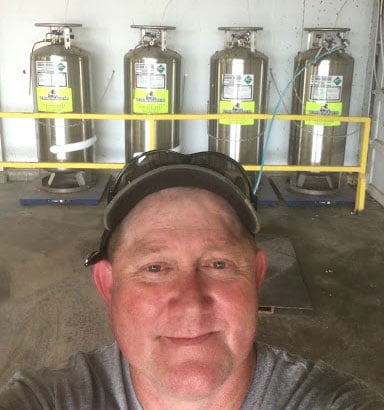
Joe Smith
Technician
Tulsa Gas & Gear
The following is an interview with Tulsa Gas & Gear technican, Joe Smith.
Tulsa Gas & Gear in Tulsa, OK is an independent supplier that stocks a broad selection of pure and blended gases. Serving an equally broad customer base ranging from aerospace to welding, the company distributes gases in a wide variety of package options. TGG has outfitted some 95% of its own tanks with Pulsa telemetry. As an installer/technician for TGG, Joe Smith sees it all and has a view of what it takes to bring order to such a varied mix. Joe described his experiences to us:
How did you start in this business?
For as long as I can remember I’ve enjoyed working with my hands and seeing the results of my labor. As a kid I remember tinkering with my bicycle, and prior to becoming a gas industry technician, I was a car mechanic. When I began with gases, I worked in welding supply and later operated a filling station. These experiences gave me a solid foundation in this industry and honed my skills. As an installer/ technician for Tulsa Gas & Gear, I do work that I love.
What have you been working on lately?
My primary responsibility is installing. I install and work on 1500-gallon and 6000-gallon tanks filled with nitrogen, argon, and some CO2 that is used for medical marijuana. I sometimes drive the semis with 1800 pounds to fill tanks when needed. I can also repair the nitrogen and CO2 pumps. This job keeps me on my toes!
What’s a typical workday like?
I install a lot Cyl-Tec Level-Eyes on carbo tanks weighing between 550 and 750 pounds. For these, I install the Level-Eyes and then add the Pulsa Link to join them to the Pulsa system. These tanks require careful calibration and cooling to ensure safety and accurate readings. Once you calibrate them that first time, they operate smoothly and need only occasional maintenance. I also install the Chart WIKA DP gauges and then add the Pulsa Link to those.
On average, I complete 2-3 installations per week, and sometimes, I have to drive up to 150 miles to reach a customer. It's a testament to our commitment to delivering excellent service, no matter the location.
What types of Pulsa sensors are you using?
I work with all of the Pulsa products. I install Pulsa Scales, and I work with Pulsa Differential Pressure sensors on tanks of various sizes, ranging from 1500 to 6000 pounds, filled with argon, nitrogen, and CO2. A lot of times I install DP sensors along with headspace sensors (Pulsa Pressure Sensors) on tanks because one measures the liquid, and one measures the head pressure in the tank.
Any tricks of the trade you can share?
One of the aspects of my job that brings me immense satisfaction is creating manifold systems, where I connect multiple tanks together in a strategic order. By setting each tank slightly higher than the previous one, I ensure they deplete in sequence. It’s a small detail that showcases my attention to detail and dedication to doing things right.
How does Pulsa help you work easier?
I have the Pulsa app on my smartphone and use it during installations. To name a sensor, we have a customer code and then we add the store number. We love that it predicts the depletion levels. We have alerts set and that way we know when we need to refill a tank. We set them approximately two weeks out and then we schedule it.
Why choose Pulsa?
We’ve ripped out a lot of other telemetry we were using because they were 3G compatible. As you know the 3G towers are disappearing and then the sensors stop working. With Pulsa, it works on 5G, 4G, 3G, and 2G. It works with all cellular networks in the U.S. so Pulsa is always online.
With Pulsa, our customers are happier. We’re getting fewer calls. As I mentioned, I love the Pulsa Dashboard, I don’t know what I’d do without it.
Is there anything else you’d like to share?
Working at Tulsa Gas and Gear has been a fulfilling experience. It’s very family oriented and they appreciate the employees, they’re good to me.
Read the next technician spotlight from Mike Ruffolo of MacCarb.


